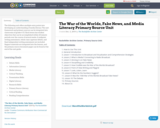
Welcome to the first, biannual Archival Educators Roundtable (AER) Newsletter! In 2016, the Rockefeller Archive Center (RAC) brought together like-minded professionals who use primary sources for public programming, outreach, and education, and the AER was born. As archival education is a still-developing field, the AER created a community where people could share their successes, challenges, and works in progress through casual workshops.AER’s network of educators, archivists, and archival education allies has since expanded its culture of support beyond the biannual meetings here at the RAC through social media, event attendance, joint publications, and email correspondence.It is our hope that this AER Newsletter will further extend the table, so speak, reaching more colleagues as we spotlight educators, and showcase the projects, challenges, and successes of archival education. Just as the aim of AER meetings is to ensure that all perspectives on primary source education are honored, we encourage you, our dedicated AER audience, to reach out and contribute your insights to future AER Newsletters! Many thanks to our first issue's contributors--we couldn't have done it without you.--Marissa Vassari, Archivist and Educator, Rockefeller Archive CenterElizabeth Berkowitz, Outreach Program Manager, Rockefeller Archive Center
- Subject:
- Arts and Humanities
- Education
- Elementary Education
- Higher Education
- Information Science
- Material Type:
- Activity/Lab
- Case Study
- Teaching/Learning Strategy
- Author:
- The Rockefeller Archive Center
- Date Added:
- 01/23/2020
